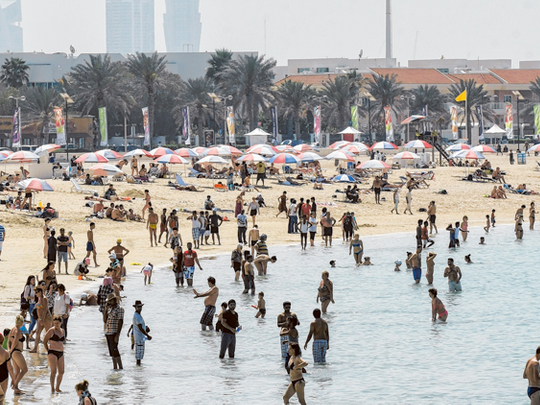
Dubai: Malasree, 37, an Indian expatriate living in sunny Dubai for the past 12 years, suffered severe cramps, neck, shoulder and knee pain. Her husband suggested that her posture, especially when working on the laptop was to blame, but changing position did not help.
It was only after a medical checkup during her annual vacation last year that Malasree realised she had Vitamin D deficiency.
Her Vitamin D level was 19 nanograms per millilitre (ng/ml). The normal level is 75 ng/ml.
Ray, an Indian man with a desk job, avoided going out in the sun because he would get a headache. He always tried and parked closest to his office and used an umbrella in summer. Even at home he always drew the curtains. A few days ago he started feeling uneasy. “I had lower back pain and body ache, he said”
A blood test showed that his Vitamin D level to be barely 3 ng/ml.
This is are just two of the many cases of people suffering from Vitamin D deficiency. A Dubai Health Authority study shows that an alarming 78 per cent of the population suffers from the condition.
Dr Waseem Raja, specialist rheumatologist at American Hospital Dubai, said Asians and those with darker skin tones, need to spend more time in the sun as their skin type takes longer to absorb ultraviolet rays.
However, too much exposure can lead to skin cancer, which is why Caucasians, whose skin has less pigmentation, need to use sunscreen.
Vitamin D is synthesised by the body when the skin is exposed to the sun. “The rest, about 10 per cent, comes from the food we eat,” the doctor said.
“Anything less than 50 ng/ml of Vitamin D is deficient,” Dr Raja said.
The symptoms of a lack of Vitamin D include lethargy ands body ache.
The rheumatologist, who worked for 12 years in Ireland before coming to Dubai, said: “In severe cases, children will have deformed legs [bow legs] and soft bones,” he said. “It’s tragic that out of 100 patients that come to my clinic, 99 of the women suffer from Vitamin D deficiency, specially the elderly.”
Dr Rihab Ahmed Al Nour, specialist international medicine at Medcare Hospital, says that people are becoming more aware about the dangers of Vitamin D deficiency.
“Our main source [of the vitamin] is from the sun; unfortunately women who cover themselves up [due to social norms] do not get enough sunlight,” she said.
She advises them to go to women-only beaches and expose the face, arms and back for 15 minutes a day.
“Vitamin D helps improve your immunity. Insufficient Vitamin D production in the skin can lead to chronic diseases such as type 2 diabetes,” she added.
Dr Anwar Al Hammadi, head of dermatology at the Dubai Health Authority, warned of too much exposure to sunlight. “Do not expose the skin to the sun from 10am to 3pm,” he said.
Vitamin D deficiency is treatable through injections and supplements, but there is no substitute for “a healthy lifestyle, nutritious diet and daily walk”, Dr Al Hammadi added.











